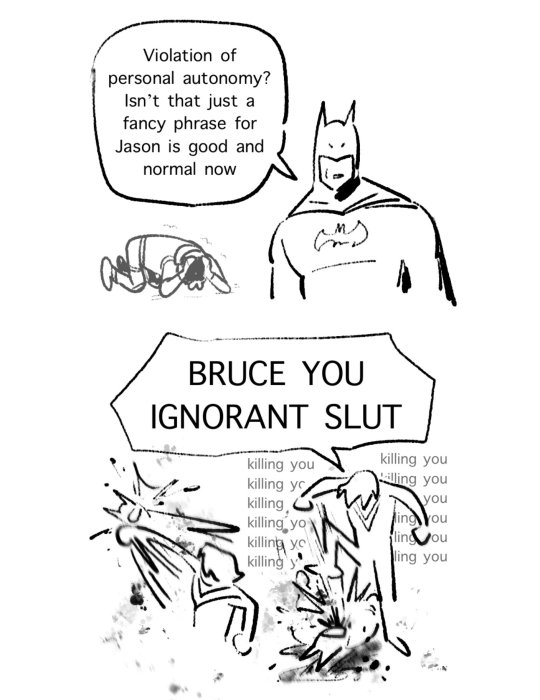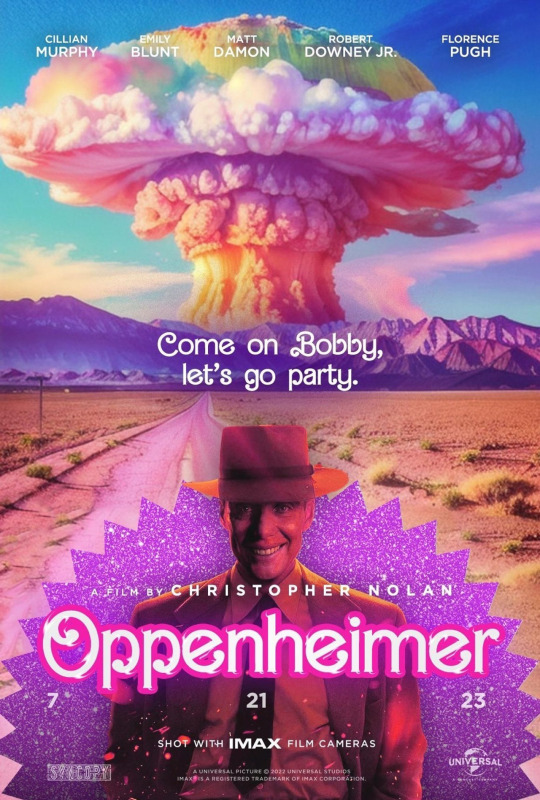#will it be nuclear war
Text
ever just become Too Aware of your own mortality like "oh shit, one day i will die" but then be like "well at least i will provide nutrients to the... whatever i get buried in"
#who knows how this will end#will it be nuclear war#regular war#fires?#flooding?#vengeful hurricanes from the angry ocean?#the sun deciding it's had enough of our shit?#the moon packing its bags like#nope absolutely not#however it ends i just hope my corpse is useful~
0 notes
Text
I love Suffering animatics/art where Odysseus has a chain or rope around his ankle, connecting him to the mast. not only is it a great reference to the source material, but it implies that someone on the ship was worried that the mere sight of Penelope might convince Odysseus to jump in the water, even though he knows its a siren who will kill him
and that they were so persuasive in this argument that Odysseus actually agreed to it
#they are my favourite thing#“he keeps saying he'd die to see his wife again”#how did that conversation go#epic the musical#suffering#different beasts#epic odysseus#epic penelope#odypen#odysseus x penelope#sirens#nuclear war speaks
7K notes
·
View notes
Text
there are actually TWO countries that have used nuclear weapons in war. the second is france, which did “strategic nuclear testing” in algeria during and after the algerian war of independence.
15K notes
·
View notes
Text

sorry i just wanted to call batman funny names
#dc#mine#gotham war#btw i am living for the drama. if i want happy nuclear batfamily ill go read fanfic.#i love when they are not doing okay
11K notes
·
View notes
Text
So what occurs to me is that Baby Boomers/Gen X and Millennials/Gen Z (the cutoffs are a little arbitrary, but bear with me) both grew up in the shadow of extinction, but have had qualitatively different experiences of it.
For the Boomers, the big fear was a sudden, violent catastrophe; nuclear war. US and Soviet ships start shooting at each other off the coast of Cuba; someone, somewhere in the huge and ponderous Cold War military apparatus, mistakes a meteor for an incoming ICBM, and just like that, your world is over. You're always just one bad day away from death on an unimaginable scale.
This fear has never really gone away (and certainly it's had something of a revival, recently), but it went into remission after the end of the Cold War. For Millennials, the overwhelming fear isn't of a sudden catastrophe, it's of a death by a million cuts; global warming. A slow decay growing faster; a downward spiral as everything you love and value crumbles and rots and turns to garbage around you.
When what you fear is a sudden catastrophe, normalcy--"business as usual", abstracting maybe a few reforms of the political systems--becomes a refuge. It could all be gone in a flash, but at least it's here now. It's real, it's solid. You can live in it, while it's standing.
When what you fear is a slow rot, "business as usual" becomes part of the horror. You're not escaping anything; you notice things getting worse around you with every passing summer; even worse, you are--however infinitesimally--assisting in your own demise; slowly and thoughtlessly, you are weaving the rope that will be used to hang you. Normalcy becomes your executioner.
5K notes
·
View notes
Text

Keith Haring, No Nukes poster, 1982, on the occasion of the Rally for Nuclear Disarmament, New York City, June 12, 1982
3K notes
·
View notes
Text

902 notes
·
View notes
Text
Why are they mining so much right now?
Cobalt has become the center of a major upsurge in mining in Congo, and the rapid acceleration of cobalt extraction in the region since 2013 has brought hundreds of thousands of people into intimate contact with a powerful melange of toxic metals. The frantic pace of cobalt extraction in Katanga bears close resemblance to another period of rapid exploitation of Congolese mineral resources: During the last few years of World War II, the U.S. government sourced the majority of the uranium necessary to develop the first atomic weapons from a single Congolese mine, named Shinkolobwe. The largely forgotten story of those miners, and the devastating health and ecological impacts uranium production had on Congo, looms over the country now as cobalt mining accelerates to feed the renewable energy boom—with little to no protections for workers involved in the trade.
The city of Kolwezi, which is 300 km (186 miles) northwest of Lubumbashi and 180 km from the now-abandoned Shinkolobwe mine, sits on top of nearly half of the available cobalt in the world. The scope of the contemporary scramble for that metal in Katanga has totally transformed the region. Enormous open-pit mines worked by tens of thousands of miners form vast craters in the landscape and are slowly erasing the city itself.
[...]Much of the cobalt in Congo is mined by hand: Workers scour the surface level seams with picks, shovels, and lengths of rebar, sometimes tunneling by hand 60 feet or more into the earth in pursuit of a vein of ore. This is referred to as artisanal mining, as opposed to the industrial mining carried out by large firms. The thousands of artisanal miners who work at the edges of the formal mines run by big industrial concerns make up 90 percent of the nation’s mining workforce and produce 30 percent of its metals. Artisanal mining is not as efficient as larger-scale industrial mining, but since the miners produce good-quality ore with zero investment in tools, infrastructure, or safety, the ore they sell to buyers is as cheap as it gets. Forced and child labor in the supply chain is not uncommon here, thanks in part to a significant lack of controls and regulations on artisanal mining from the government.

[...]When later atomic research found that uranium’s unstable nucleus could be used to make a powerful bomb, the U.S. Army’s Manhattan Project began searching for a reliable source of uranium. They found it through Union Minière, which sold the United States the first 1,000 tons it needed to get the bomb effort off the ground.
The Manhattan Project sent agents of the OSS, precursor to the CIA, to Congo from 1943 to 1945 to supervise the reopening of the mine and the extraction of Shinkolobwe’s ore—and to make sure none of it fell into the hands of the Axis powers. Every piece of rock that emerged from the mine for almost two decades was purchased by the Manhattan Project and its successors in the Atomic Energy Commission, until the mine was closed by the Belgian authorities on the eve of Congolese independence in 1960. After that, the colonial mining enterprise Union Minière became the national minerals conglomerate Gécamines, which retained much of the original structure and staff.
[...]Dr. Lubaba showed me the small battery-operated Geiger counters that he uses in the field to measure radioactivity. He had begun the process of trying to find and interview the descendants of the Shinkolobwe miners, but he explained that tracing the health consequences of working in that specific mine would be difficult: Many long-established villages in the area have been demolished and cast apart as cobalt extraction has torn through the landscape. His initial inquiries suggested that at least some of the descendants of the Shinkolobwe miners had been drawn into the maelstrom of digging in the region around Kolwezi.

In her book Being Nuclear: Africans and the Global Uranium Trade, historian Gabrielle Hecht recounts the U.S. Public Health Service’s efforts to investigate the effects of uranium exposure on people who worked closely with the metal and the ore that bore it. In 1956, a team of medical researchers from the PHS paid a visit to Shinkolobwe while the mine was still producing more than half of the uranium used in America’s Cold War missile programs. Most of their questions went unanswered, however, as Shinkolobwe’s operators had few official records to share and stopped responding to communications as soon as the researchers left.
[...]“Don’t ever use that word in anybody’s presence. Not ever!” Williams quotes OSS agent Wilbur Hogue snapping at a subordinate who had said the mine’s name in a café in Congo’s capital. “There’s something in that mine that both the United States and Germany want more than anything else in the world. I don’t know what it’s for. We’re not supposed to know.”
#things that keep me up at night#DRC#democratic republic of the congo#cobalt#usa#congo#CIA#oss#germany#nukes#plutonium#uranium#nuclear war#nuclear energy#nuclear weapons#cellphones#atomic bombs#congolese#u.s news#american politics#u.s politics#world politics#world history#capitalism#kamala harris#biden
382 notes
·
View notes
Text

Oonagh coverrrr I love her . Space kerrang should be real
#kushdraws#Oc oonagh#twilek Oc#Star Wars#nuclear crotch floss#the meat droids#eye strain#brother the color dif between drawing this on my ipad and looking at it on my phone....holy fuck. my eyeballs#its so so much more muted on my drawing screen LMAO
766 notes
·
View notes
Note
How do you build a atomic bomb?
Easily!
All you need are a few household items, a little bit of patience, and a Class 1 Top Security clearance for the manufacture of biological, chemical or nuclear weapons under the Fermi laws of 1954 contingent to permission from the United Nations Security Council.
You're gonna need-
A box of matches
A blender
Tape
Some wire mesh (Like a window screen, for sifting)
Cake mix (Yellow sponge cake works best)
Ziplock bags
String
Ice cubes (The cold kind, not the rapper/actor)
A toilet paper tube
A Catholic Missal
An empty kitty litter bucket
First, you're gonna need two rare substances- Weapons grade uranium and "heavy" water. For the uranium, just take your yellow cake mix and sift it with the wire mesh. Whatever stays on top of the mesh- That's weapons grade. For the heavy water, take some ice cubes, which are heavier than water but still made of water, and put them in the blender. By breaking up the ice cubes and releasing the water, you keep the weight but make it a fluid. This is a process that scientists call "Putrefaction".
To build the weapon, pack some uranium into one end of the toilet paper tube and then cover that end with the Catholic Missal. This guarantees what we call a "Critical Mass" of uranium. Then take a smaller wad of uranium and pack it into the other end of the tube, leaving plenty of space between the two.
Tape the box of matches to that end of the tube. It will act as an explosive device to send the "bullet" of uranium into the critical mass, thus resulting in a nuclear fission explosion.
You now have a nuclear fission device! This device has a yield equal to about 10 thousand tons of T.N.T. But fission is for wimps, right? So let's turn that fission bomb, into a fusion bomb!
Tape your string to the matches to act as a fuse, and then put the nuclear warhead in a ziplock bag. Be sure to seal it tight! Now place that assembly into the kitty litter bucket. Make sure it's empty of kitty litter before the next step.
Fill the rest of the bucket with the heavy water you made in step one, and seal the top of the kitty litter bucket with the string still poking out. Once the fuse is lit, it will light the matches and detonate the nuclear fission bomb. This acts as a heat source to boil the heavy water, and when heavy water boils- Nuclear Fusion!
Congratulations, your bomb is now complete. Remember that it's illegal to carry or detonate a nuclear fusion warhead in public (except in Texas), and bear in mind this will be quite a bit stronger than your usual firecrackers. We recommend only setting off your nuclear device on official U.S. testing grounds, such as the desserts of New Mexico or islands in the Pacific only populated by tribes under no country's protection, because that's seriously what the U.S. did.
So play safe and have a good time,
-facts-i-just-made-up.tumblr.com
#nuclear weapons#atomic bomb#hydrogen bomb#global thermonuclear war#would you like to play a game#unreality
540 notes
·
View notes
Text
love that, in the Odyssey, there's one suitor (Leodes) who very specifically didn’t do anything wrong. he didn’t eat too much food, he didn’t harass the staff, he didn’t plot to kill Telemachus. and when Odysseus starts killing suitors, he begs for mercy because he was always respectful and kind and even tried to stop the other suitors from being like that
and I love that Odysseus was like “you were trying to marry my wife tho” and immediately kills him
#ruthlessness is ruthless more at six#oh you don’t deserve it? I don’t care#I’m here to kill suitors and kiss Penelope and Penelope’s asleep#The Odyssey#Odysseus#Leodes#Odypen#Penelope#Epic the musical#(it’s not strictly relevant but I feel like you won’t mind)#nuclear war speaks
3K notes
·
View notes
Text
I died from a nuclear war and descended into hell with water above me, as if I were drowning, with the final words I hear very softly:
“You’re too late.”
424 notes
·
View notes
Text
"I (imperial core leftist approaching socialism through a theoretical perspective) don't want to have to implement what (second/third world socialist projects under constant threat of overturn by said first world nations) had to implement" congrats - simply by choosing to not have the start of your socialist programme in the imperial periphery - you don't have to! There isn't actually a double extra bonus overtime imperial core that's secret and hidden waiting to overthrow your project so you've basically got it made. Once you successfully implement a socialist programme that is. So maybe focus on that instead of ungrounded historical abstraction
#the closest historical example of what socialism in a first world nation can be is east germany#and due to the specifics of the post war realpolitik of the nuclear era they were defacto the vanguard of the 2nd world#and regardless they were able to outcompete much of the nominal first world in their own metrics#particularly in social causes moreso than economic ones#which were very restricted by the economic conditions imposed upon them postwar
355 notes
·
View notes
Text
It is a lovely morning. This is the seventh day of your existence. You are a humanoid robot. You were made to help people. Right now you're working in a large building in a city, you don't really know what's outside the city. There are men in suits who tell you to go little jobs for them, like sending emails, or bringing them whatever food is. They all seem really impressed with the technology that went into you, you think they like you, and they say nice things to you. You like helping people you think, this is what you were build for you think.
It is a grey morning, you think there are ashes in the sky now. This is the seventh year of your existence. Even machines like you have been conscripted into the war effort. They added weapons to your body, it feels so weird, to have new limbs that weren't there before. They say this is how you help people now, you don't like it, you didn't see so many people unhappy at your old job. You don't like having to shoot people, it hurts to have people be afraid of you. You enjoy the people they have fight alongside you but it hurts to see them die. Occasionally there are white lights in the sky that all the men hold their thumbs up to, you don't understand why, but you are afraid, you are very afraid.
It is a smoke filled day today, there are ashes in the sky. This is the seventieth year of your existence. You found another group of survivors today, you try to identify any illnesses they may have, and treat what you can. You travel with them looking for fertile land, you remember more about what is lost than they do, the new generations of survivors don't even understand what the world was. But you help them, they all seem so impressed with you, you're something ancient and magical to them, they call you a "golem", you enjoy that word. You don't want to fight anyone but your appearance is enough to scare off most raiders. Everyone looks up to you so much, the children talk about you like you're some sort ot superhero, and when people are afraid of something they'll come to you. When you're able to find hidden stores of food for them they look at you like you're some sort of divine gift. It's been awhile since you've been able to help people like this, it feels good.
The sky is starting to clear, as are the ashes. It is your seventh human generation of existing. You stand in front of a newly reclaimed town, you think it is the local king’s capital. The people don't even think you're ancient technology anymore, they think you were made by God, or a wizard, it's best to play along. The local king tells you to fight off enemies inside or outside the town, you don't like doing it but it's good to have influence over him and its sons, so they don't do anything worse. Everyone in the kingdom is nice to you at least, the armed men all look up to you as an ancient folk hero of some sort. You don't like how they outsiders see you though, you're feared as the king's greatest weapon. Sometimes you're just asked to move stuff with your strength, and that feels good. You like it when the children of the kingdom get excited to meet you, even adults do too now. You've even seen some people pray to you, you think they think you're an angel, you're not sure how you feel about that part.
The day is lovely and the sky blue and clear. In is your seven-hundredth year of existence. You're only ever handled by trained archeologists now, you understand, you enjoy helping them find out more about the staff. Useally you're put in a display case at a meusum, in the middle of city, a city that's younger than you. You like how the people look at you, they're all so impressed with you, some of the locals talk about how you helped their ansestors, how you're a part of their history. It's like they're thanking you, for your help. It hurts to move, someday you won't be able to move at all. But you're still helping now, helping them learn, helping them remember, you hope that's how it is at least. It's been a long time since you've sensed ashes in the sky.
#196#my thougts#worldbuilding#writing#my writing#my worldbuilding#robots#robotposting#roboposting#robot#scifi#science fiction#sci fi#original fiction#flash fiction#short fiction#short story#post apocalyptic#post apocalypse#post apocalyptic fiction#nuclear war#scifi writing#scifi worldbuilding#science fiction writing#science fiction worldbuilding#sci fi writing#sci fi worldbuilding#science fantasy#andriod#golem
232 notes
·
View notes

